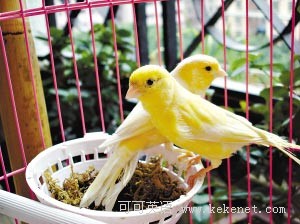我们刚结婚时朋友们把我们叫做“恩爱鸟”, 我想我和唐不愧于这个名字。由于我们俩都是全日制学生, 靠打工挣学费, 所以手头总是很紧。有时我们为了买个冰淇淋蛋卷就要攒好几天的钱。即使如此, 我们那个狭小、简陋的寓所却像天堂一般, 你要知道, 这是因为有了爱。

【听力原文】
When Snowball Melted
Lovebirds. That’s what all our friends called us when we first married. I guess Don and I deserved1) it. Money was tight because we were both full-time students, working to pay our way through school. Sometimes we‘d have to save up days just for an ice cream cone. Still, our tiny, drab apartment seemed like paradise. Love does that, you know.
Anyway, the more we heard the term“lovebirds, ”the more we thought about birds. And one day we started saving up for a couple of lovebirds of our own:the feathery2) kind. We knew we couldn’t afford to buy both birds and a nice cage, so in his spare moments, Don made the cage himself.
We set our cage in front of a shaded window. Then we waited until the crumpled envelope marked“lovebirds”was full of bills and spare change. At last the day came when we were able to walk down to our local pet store to“adopt ”some additions to our little family.
We‘d had our hearts set on parakeets3). But the minute we heard the canaries4) singing, we changed our minds. Selecting a lively yellow male and a sweet white female, we named the youngsters Sunshine and Snowball.
Because of our exhausting schedules, we didn’t get to spend too much time with our new friends, but we loved having them greet us each evening with bursts of song. And they seemed blissfully5) happy with each other.
Time passed, and when our young lovebirds finally seemed mature enough to start a family of their own, we went ahead and prepared a nest area and lots of nesting material for them. Sure enough, one day they began to find the idea very appealing. Snowball was a very exacting supervisor6) in designing and decorating their nest just so, while Sunshine, his face a glow with love, bent over backward to put everything just where she ordered.
Then one day an egg appeared. How they sang.And a few weeks later when a tiny chick hatched, their happiness seemed to know no bounds. I don’ t know how it happened genetically, but that baby canary was bright orange. So right off we named him Punkinhead.
The sunny days passed. How proud all of us were when our fledgling tottered out of the nest onto a real grown-up perch7).
Then one day, Punkinhead suddenly plunged headlong from his perch to the bottom of the cage. The tiny orange bird just lay there. Both parents and I rushed to his rescue.
But he was dead. Just like that. Whether he’d had a heart attack before he fell or broke his neck in the fall I’ll never know. But Punkinhead was gone.
Though both parents grieved, his little mother was inconsolable8). She refused to let either Sunshine or me get near that pitiful little body. Instead of the joyful melodies9) I usually heard from Snowball, now she gave only the most excruciating cries and moans10). Her heart, joy and will seemed completely melted by her sorrow.
Poor Sunshine didn’t know what to make of it. He kept trying to push Snowball away from her sad station, but she refused to budge. Instead, over and over she kept trying to revive her adored child.
Finally Sunshine seemed to work out a plan. He convinced her to fly up and eat some seeds every so often, while he stood duty in her place. Then each time she left, he’d quietly place one piece of nesting straw over Punkinhead’s body. Just one. But in a few days, piece by piece, it was completely covered over.
At first Snowball seemed disoriented when she looked around, but she didn’t try to uncover the chick. Instead, she flew up to her nor-mal perch and stayed there. Then I was able to quietly reach in and remove the little body, straw shroud and all.
After that, Sunshine spent all his time consoling Snowball. Eventually she started making normal sounds, and then one day, her sorrow finally melted and she sang again.
I don’t know if Snowball ever realized the quiet labor of love and healing Sunshine had done for her. But they remained joyously devoted for as long as they both lived. Love does that, you know.
Especially to lovebirds.
□by Bonnie Compton Hanson












